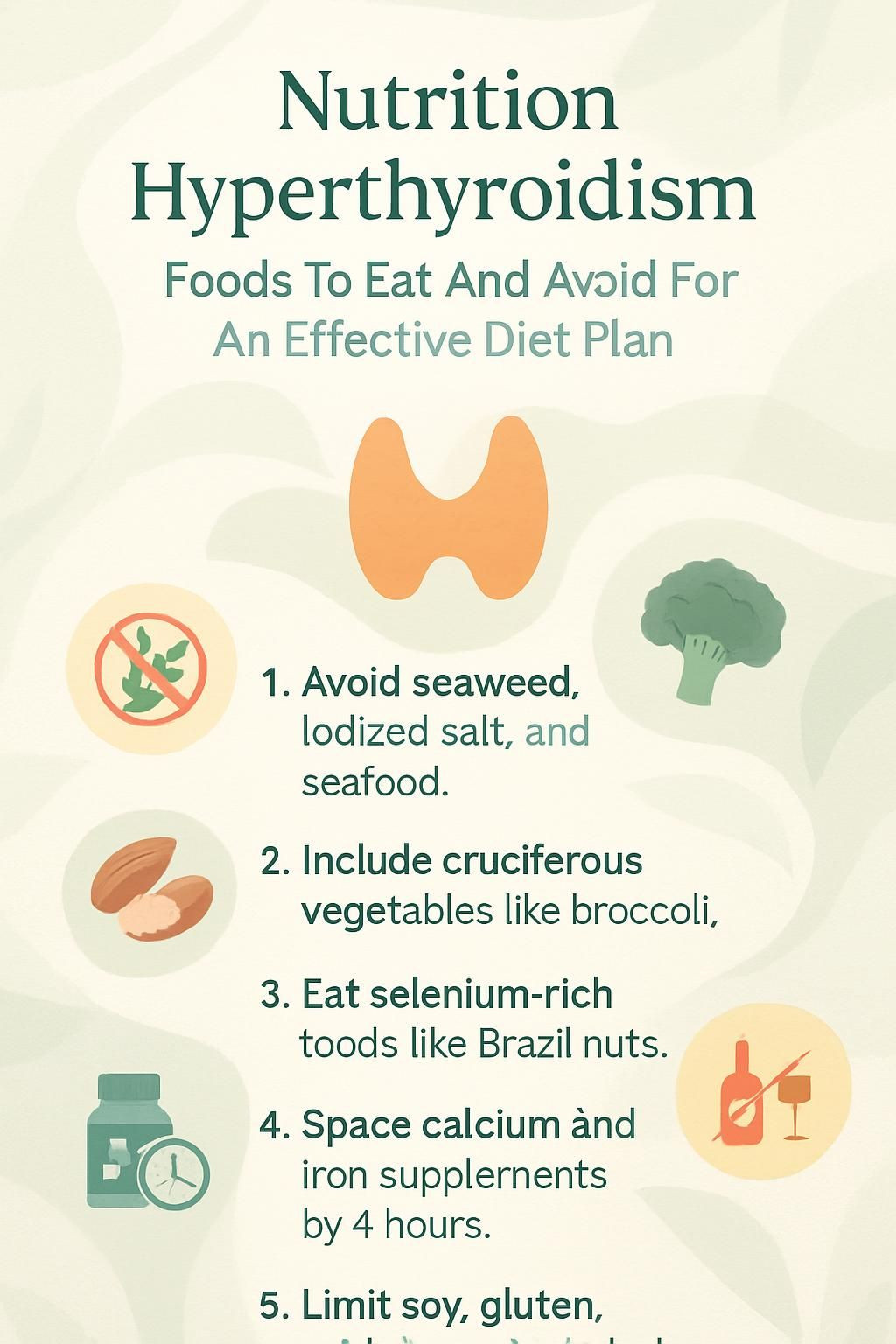Nutrition Hyperthyroidism: Foods To Eat And Avoid For An Effective Diet Plan
Our Nutrition Assistant AI Suite will transform your body. You will lose fat, get toned, and build muscle. Gain confidence and optimal health.
Feeling unsure about what to eat with hyperthyroidism is common. This thyroid disorder happens when your thyroid gland makes too much thyroid hormone. That surge can speed up metabolism and trigger weight loss, anxiety, and a fast heartbeat.
Nutrition Hyperthyroidism means using food choices to support treatment and steady thyroid function. This guide shows foods to eat, foods to avoid, and simple habits that fit a low iodine diet. Small daily changes can ease symptoms and support care from your medical team.
Key Takeaways
- Low-iodine eating is a core strategy for hyperthyroidism. Limit seaweed, iodized salt, most seafood, and many dairy items to reduce hormone overproduction and to prepare for radioactive iodine therapy if prescribed.
- Cruciferous vegetables like broccoli, kale, and cauliflower contain goitrogens, natural compounds that may help reduce thyroid hormone production when eaten regularly, as noted by the Linus Pauling Institute.
- Selenium-rich foods such as Brazil nuts, eggs, and sunflower seeds support antioxidant enzymes and may lower antithyroid autoantibodies. Trials show six months of selenium can help people with Graves’ eye disease.
- Separate calcium or iron supplements from levothyroxine by at least four hours. These minerals can block absorption, a precaution supported by the American Thyroid Association.
- Limiting soy, gluten-containing grains, caffeine, alcohol, ultra-processed foods, and added sugars may reduce symptom flares and support medication effectiveness.

Understanding Hyperthyroidism and Nutrition

Hyperthyroidism means the thyroid gland, a small butterfly-shaped organ in the neck, releases too much hormone. These hormones, thyroxine or T4 and triiodothyronine or T3, control your body’s energy use. Too much speeds up many processes.
What is hyperthyroidism and how does it affect the body?
The thyroid sits at the front of your neck and shapes like a butterfly. In hyperthyroidism, it produces too much thyroid hormone. Extra T4 and T3 push the body to work at a faster pace.
Graves’ disease is the most common cause in the United States. It affects women more often than men.
Common signs include weight loss, increased appetite, mood changes, and poor sleep. You might notice sweating, heat sensitivity, rapid or pounding heartbeats, and muscle weakness.
Hand tremors can appear. Some people develop a goiter, bowel changes, skin or hair issues, and eye problems.
If untreated, risks rise for heart strain and weaker bones.
When your thyroid gland works too hard, it pushes every cell to work faster than normal.
How does nutrition influence hyperthyroidism management?
Food choices can support thyroid care. The right diet can calm symptoms and help other treatments work well.
Many people are advised to follow a low iodine diet before radioactive iodine therapy. Seaweed like kelp or dulse can add large amounts of iodine and may fuel an already overactive thyroid gland.
Building meals around whole foods helps you avoid hidden iodine in restaurant dishes and packaged items. For autoimmune causes like Graves’ disease, limiting extra iodine sources may prevent further stimulation of thyroid tissue.
Medical groups, including the American Thyroid Association, endorse limiting high-iodine foods during treatment phases. Review supplements too. Iron and calcium can affect how thyroid medications are absorbed.
Thoughtful nutrition gives you a measure of control. It supports symptom relief while your healthcare team guides testing and therapy.
Key Aspects of a Hyperthyroidism Diet
Eating well can steady your energy and help manage the effects of an overactive thyroid gland. Focus on simple steps you can repeat every day.
What diet strategies help manage hyperthyroidism symptoms?
Start with a low iodine diet. Cooking at home makes it easier to control salt and additives that may contain iodine.
- Skip seaweed, iodized salt, and high-iodine dairy to help stabilize thyroid hormone levels.
- Enjoy cruciferous vegetables, such as broccoli and cauliflower, two to four times per week.
- Add selenium foods like Brazil nuts, eggs, or sunflower seeds to support thyroid enzymes.
- Include calcium and vitamin D from fortified plant milks or leafy greens to protect bone density.
- Stay well hydrated to support metabolism and reduce headaches or fatigue.
One friend with Graves’ disease felt steadier after switching to a home-cooked, low iodine plan and tracking fluids.
Focusing on a whole foods, low-iodine diet helped me feel more in control of my hyperthyroidism symptoms.
Discuss diet changes or supplements with your healthcare provider or a registered dietitian. They can align your plan with lab results, medications, and current guidelines.
How can nutrition support thyroid health?
Several nutrients play important roles in thyroid function. Aim to include these foods most weeks.
- Selenium supports the conversion of T4 to T3. Sources include Brazil nuts, eggs, rice, couscous, beans, mushrooms, poultry, chia, and sunflower seeds.
- Zinc aids immune function and energy use. Good choices are lean beef, chickpeas, cashews, cocoa powder, mushrooms, and pumpkin seeds.
- Calcium and vitamin D help protect bones, which may be at risk with hyperthyroidism.
- Healthy fats from avocados, nuts, seeds, olives, and fish can help calm inflammation.
- Spices like turmeric and ginger support your body’s natural anti-inflammatory response.
During a stretch of fatigue, adding pumpkin seeds gave me steady energy between meals.
Recommended Foods for Hyperthyroidism
Build your meals around foods that support thyroid balance. Think low iodine, plant-forward, and nutrient dense.
Why choose low-iodine foods?
Limiting iodine can help manage hyperthyroidism. Too much iodine can drive extra hormone production.
Doctors may recommend a low iodine diet before radioactive iodine treatment to improve its effect. High iodine foods include kelp, dulse, seafood, dairy, and foods made with iodized salt.
Home cooking helps you avoid hidden iodine from sauces, seasonings, and processed foods. Following an evidence-based plate pattern, with higher fiber starchy foods like potatoes, bread, rice, and pasta, can be both filling and low in iodine.
Choosing plain ingredients and simple seasonings makes it easier to regulate hormone levels and support antithyroid medications.
What are the benefits of cruciferous vegetables?
Low-iodine eating helps, and cruciferous vegetables add another layer of support. Cabbage, cauliflower, kale, and Brussels sprouts are standouts.
These plants contain goitrogens, compounds that may gently slow thyroid hormone production. The Linus Pauling Institute notes the goiter risk is very low at normal intake levels.
Emerging research explores links between gut bacteria and thyroid autoimmunity, including Graves’ disease. A varied plant-rich diet can support a diverse gut microbiome.
Adding kale and cauliflower helped me feel fuller and boosted fiber and vitamin C. Current evidence supports these vegetables as a safe choice for most people with hyperthyroidism.
How do selenium-rich foods support thyroid function?
Selenium is vital for thyroid enzymes that convert T4 to T3 and protect cells from stress.
Top sources include Brazil nuts, tuna, sardines, eggs, legumes, rice, oat bran, mushrooms, chia seeds, poultry, sunflower seeds, and couscous.
In autoimmune thyroid disease, selenium intake may reduce antithyroid autoantibodies. A clinical trial found six months of selenium improved quality of life for thyroid eye disease.
The tolerable upper intake for adults is about 400 micrograms per day. Too much can be harmful. Many people meet needs with a few Brazil nuts per week. Talk with your clinician before using high-dose supplements.
What role does iron play in a hyperthyroidism diet?
Iron helps your body make thyroid hormones and carry oxygen in the blood. Fast metabolism can raise nutrient needs, including iron.
Low iron can cause fatigue and lower exercise tolerance. It is more common during pregnancy and in those with low dietary intake.
My energy improved after I added lean meats, beans, and leafy greens when labs showed borderline iron levels.
If you take antithyroid drugs or levothyroxine, take iron supplements at least four hours away from your dose to avoid absorption problems. Iron-rich foods include lean beef, chicken liver, lentils, tofu if tolerated, and fortified cereals.
Why are calcium and vitamin D important?
Hyperthyroidism can thin bones. Calcium and vitamin D work together to build and maintain bone tissue.
Vitamin D helps absorb calcium and phosphate from the gastrointestinal tract. The NHS suggests adults and children over five take 10 micrograms of vitamin D daily during autumn and winter.
Certain people, including those with darker skin or limited sun exposure, may need vitamin D year-round. If you use levothyroxine, separate it from high-calcium foods or supplements by four hours to protect absorption.
Next, learn how to include healthy fats without unwanted additives.
How can healthy fats be included in the diet?
Healthy fats support hormone health and keep meals satisfying.
- Include avocado, nuts, seeds, olives, and fish like salmon or sardines several times a week.
- Cook with small amounts of extra virgin olive oil.
- Swap frying for baking or grilling to reduce added fats.
- Stir chia or flax into oatmeal. Add walnuts to salads. Use mashed avocado on toast.
A dietitian once told me she added chopped nuts to yogurt for flavor and key nutrients while monitoring thyroid levels.
Why choose whole grains?
Whole grains, such as brown rice, oats, quinoa, and whole wheat bread, provide steady energy. That matters when metabolism runs fast.
Higher fiber grains support digestion and help you feel full longer. They also provide minerals like iron and magnesium.
During a recovery phase, a bowl of oatmeal kept my morning energy level steady.
Whole grains are gentle on the gut and support regular bowel movements, which can help if digestion feels off.
What fresh fruits and vegetables are best?
Pair whole grains with colorful produce for a strong foundation.
- Berries, citrus, kiwi, and apples add vitamin C and fiber that support immunity.
- Cruciferous vegetables, including broccoli and Brussels sprouts, may help moderate hormone production.
- Leafy greens such as spinach and kale provide magnesium and iron for cell function.
- Carrots, peppers, tomatoes, and squash bring vitamin A and other antioxidants.
- Water-rich choices like cucumbers and watermelon support hydration.
Aim for at least five portions of fruits and vegetables per day to cover vitamins and minerals that support thyroid health.
Foods to Limit or Avoid with Hyperthyroidism
Some foods can ramp up symptoms or interfere with thyroid care. Knowing your foods to avoid keeps your plan simple and safe.
Which iodine-rich foods should be avoided?
Sea vegetables like kelp, dulse, and sea moss contain very high iodine. Avoid them if you have hyperthyroidism, especially with Graves’ disease.
Seafood such as shrimp, crab, lobster, cod, and some tuna can also be high in iodine. Dairy products and eggs often contribute more iodine than expected.
Restaurant and packaged foods may contain hidden iodine from iodized salt or additives. Read labels on boxed meals, sauces, marinades, and snacks.
If a low iodine diet is recommended, choose non-iodized salt at home and keep seaweed off your menu.
Should soy-based products be limited?
Soy can interfere with the absorption of levothyroxine when taken close together. Leave at least four hours between your dose and soy foods.
Soy is typically not a major iodine source. Still, some research suggests it may affect certain treatments in animals. If you use thyroid medication or have Graves’ disease, track how soy milk, tofu, or edamame affects your symptoms.
My symptom control improved after I separated soy intake from my morning dose, as my doctor advised. Ask your clinician about soy if you are adjusting your diet during treatment.
Why avoid gluten-containing foods?
Some people with autoimmune thyroid disease also have celiac disease or gluten sensitivity. In that case, gluten can inflame the gut and may worsen symptoms.
If you have Graves’ disease or Hashimoto’s thyroiditis, screening for celiac disease can be helpful. A short gluten-free trial, guided by a clinician or dietitian, may be considered in select cases.
One parent managing a child’s Graves’ eye symptoms noticed fewer flares after a gluten-free trial. Responses vary, so work with your healthcare team before removing gluten long term.
Next, consider how stimulants may impact a racing heartbeat.
How does caffeine and energy drink intake affect hyperthyroidism?
Caffeine from coffee, tea, soda, and chocolate can intensify anxiety, tremors, and palpitations. Many people feel jittery after even small amounts.
If symptoms worsen with caffeine, try herbal teas or flavored water. During my hyperthyroid phase, tiny amounts of caffeine increased hand shaking, so I switched to caffeine-free drinks.
Energy drinks often contain high doses of caffeine. Avoid them while you work to steady thyroid hormone effects.
Why reduce alcohol consumption?
Alcohol can interfere with how thyroid medications work. It can also worsen a fast heartbeat or anxious feelings.
Reducing alcohol helps treatments do their job. Clients I coached reported better energy and steadier moods after cutting back.
Next, take a close look at processed foods and added sugars.
What are the risks of processed and sugary foods?
Highly processed foods often carry excess sodium, unhealthy fats, and added sugars. They crowd out nutrients like selenium and iron that support thyroid health.
Sugary snacks and drinks cause sharp swings in blood sugar and energy. Limiting them may ease anxiety and rapid heartbeat.
Choose whole grains and fresh fruit to help stabilize energy and support a thyroid-friendly plan.
Dietary Strategies for Hyperthyroidism
Food timing, hydration, and meal size can be as important as food choice. Think of these as daily tools you can use.
Why eat smaller, frequent meals?
Smaller, frequent meals help steady blood sugar and energy. Hyperthyroidism speeds up metabolism, so long gaps between meals can cause shakiness or irritability.
Eating every three to four hours can reduce headaches and mood swings. When I spread meals across the day, my heart felt calmer and focus improved.
How important is hydration for hyperthyroidism?
Staying hydrated supports a fast metabolism and helps prevent dehydration due to sweating or loose stools. Aim for at least 6 to 8 glasses of fluid daily.
Hot weather or exercise can raise fluid needs. Sipping water across the day kept my energy steadier and reduced headaches. Water-rich fruits and vegetables also help you reach your goals.
Why maintain consistent meal times?
Regular meal times support stable blood sugar and steady energy. A routine also helps with medication timing and absorption.
Skipping meals or eating at odd hours can affect how well treatments work. Setting simple reminders for meals helped me feel less jittery and more focused.
What antioxidant-rich foods help?
Turmeric, green chilies, and black pepper bring flavor and antioxidants. Curcumin in turmeric supports cell health. Vitamin C in chilies protects tissues and supports immunity. Black pepper may enhance curcumin absorption.
Fruits and vegetables like berries, oranges, spinach, and kale also fight oxidative stress. I started using turmeric in soups and adding berries to breakfast for a simple boost.
Should spicy foods be limited?
Most people with hyperthyroidism can enjoy spices. Ginger and garlic may help reduce inflammation.
If spicy foods trigger heartburn or stomach upset, cut back to a comfortable level. Track your response and adjust. Spices do not drive thyroid hormone release.
Supplements to Consider for Hyperthyroidism
Some supplements can support nutrient gaps, but they should fit your lab results and medications. Always discuss with your clinician first.
What are the benefits of selenium supplements?
Selenium can help manage symptoms in thyroid eye disease. Studies show that six months of selenium improved quality of life for many people and was well tolerated.
Selenium may also lower antithyroid antibodies in some autoimmune conditions. Avoid high doses without guidance. Very large intakes can be unsafe.
Tell your doctor about all supplements before testing. Certain minerals can influence lab values.
How do vitamin D and calcium supplements help?
Vitamin D helps absorb calcium and phosphate, which support bone strength. Low vitamin D is common in thyroid disease and can raise fracture risk.
The NHS recommends 10 micrograms of vitamin D daily in months with little sunlight. Calcium may be needed if intake is low. Separate both calcium and iron from levothyroxine by at least four hours.
Your care team can tailor doses based on blood tests and diet patterns.
What roles do zinc and magnesium supplements play?
Zinc supports thyroid hormone production. It is found in shellfish, beef, chicken, and legumes. Small studies suggest zinc may help some people, but more research is needed.
Magnesium supports nerve and muscle function and is present in nuts, seeds, greens, and legumes. Evidence for magnesium in hyperthyroidism is limited.
High-dose mineral use can disrupt nutrient balance. Only supplement what you need.
Lifestyle Adjustments for Hyperthyroidism
Simple daily habits can help your body handle a faster pace. Pair them with nutrition for a steady routine.
What are effective stress-reduction techniques?
Slow, deep breathing and mindfulness can lower stress and settle a racing heart. Try five minutes of calm breathing each day.
Gentle yoga or stretching supports blood flow and relaxes muscles. Many people also find value in thyroid support groups for encouragement and practical tips.
Discuss new practices with your doctor, especially if you will receive iodine-131 or are pregnant. During a stressful period, a peer group kept me on track with low-iodine meals and self-care.
How does regular exercise benefit hyperthyroidism?
Exercise supports strong bones, which matters because hyperthyroidism can weaken them. Weight-bearing activity like walking or light resistance training helps preserve bone density.
Most adults benefit from at least 150 minutes of moderate activity each week. Movement lifts mood, supports sleep, and helps manage stress. A daily walk eased my anxiety after diagnosis.
Staying active can improve quality of life and make it easier to follow your nutrition plan.
Why is adequate sleep important?
Good sleep helps your body handle stress and supports hormone balance. Poor sleep can raise stress hormones and make symptoms feel worse.
Aim for 7 to 9 hours most nights. Quality sleep supports energy levels and may help you follow meal timing and medication schedules.
Frequently Asked Questions
Here are clear answers to common questions on diet and hyperthyroidism care.
Can diet reverse hyperthyroidism?
Diet cannot reverse hyperthyroidism. The cause is often autoimmune, which needs medical care with antithyroid drugs or radioactive iodine.
Food choices still matter. A low-iodine approach and nutrient-rich meals with selenium, calcium, and vitamin D support your body during treatment. Healthy eating improved my energy, but medication controlled my labs.
What foods boost thyroid health?
Build meals with selenium foods like Brazil nuts, eggs, tuna, and sunflower seeds. They support thyroid enzymes.
Add zinc sources such as lean beef, chickpeas, pumpkin seeds, and cashews. Include iron from spinach, lentils, and tofu if tolerated.
Cruciferous vegetables like broccoli and cauliflower may help balance hormone production. Whole grains such as brown rice and oats provide steady energy for daily tasks.
What beverages are safe for hyperthyroidism?
Water is best. Aim for at least eight cups daily to support metabolism and prevent dehydration.
Herbal teas such as chamomile, peppermint, or rooibos are good options if you are sensitive to caffeine. Limit coffee and tea and avoid energy drinks if they trigger palpitations or anxiety.
Conclusion
A clear hyperthyroidism diet plan centers on a low iodine diet, steady hydration, and balanced meals. Choose whole grains, colorful produce, healthy fats, and targeted minerals to support thyroid function.
Limit high-iodine foods, gluten if advised, soy around medication time, caffeine, alcohol, and ultra-processed snacks. Supplements such as selenium, calcium, and vitamin D may help, but discuss dosing with your clinician.
This information supports your care, it does not replace medical advice. Work with your healthcare provider to tailor a plan that fits your labs, medications, and symptoms. Small, consistent food choices can make a meaningful difference in daily life.
FAQs
1. What is hyperthyroidism and how does it affect nutrition?
Hyperthyroidism is a condition where the thyroid gland produces too much hormone, which can speed up cell metabolism and impact tissue health. This disease often results from autoimmune destruction of the thyroid gland or other factors that stimulate the thyroid.
2. Which foods should people with hyperthyroidism try to avoid?
People with hyperthyroidism should limit foods containing high iodine levels, such as seaweed and iodized salt, since these can further stimulate the thyroid gland. Some studies suggest avoiding soy products as they may interfere with overall thyroid function.
3. Are there specific minerals or nutrients important for those with hyperthyroidism?
Selenium plays a key role in supporting healthy thyroid tissue and hormone balance; research shows selenium supplementation on thyroid hormone levels may help manage symptoms associated with this disease. Calcium-rich foods are also important because bone loss can occur when hyperthyroidism goes untreated.
4. How do certain foods help manage symptoms of hyperthyroidism?
Foods rich in antioxidants like fruits and vegetables support cell health by reducing inflammation linked to autoimmune diseases affecting the thyroid. Lean proteins help maintain muscle mass lost due to increased metabolism caused by excess hormones.
5. What guidelines ensure an effective diet plan for someone diagnosed with hyperthyroidism?
Strict sourcing guidelines recommend relying on peer-reviewed data about dose requirements for each mineral nutrient needed by individuals following a diet (nutrition) plan tailored to their effect on thyroid function; regular monitoring helps adjust intake based on biochemistry changes over time.
Summary:
A well-managed diet supports those living with hyperthyroidism through careful selection of foods containing essential nutrients while limiting items that could worsen symptoms or disrupt hormone balance according to evidence-based recommendations.







